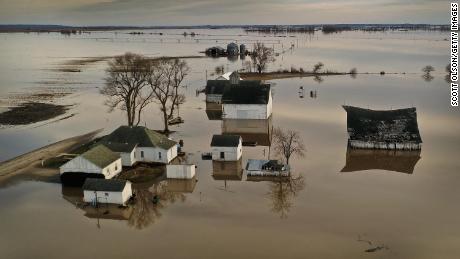2019 is already a devastating year for tornado deaths. Thirty-one people have so far been killed by tornadoes, compared to 10 in all of 2018 and 35 in 2017. Both Texas and Oklahoma have already seen fatalities. In Oklahoma, following Monday’s severe weather, flood rescues are underway; the National Weather Service urged residents in the Tulsa area to move to higher ground.
But what happens to the people who survive the storm when their homes have been destroyed? For many — notably the poor, minority groups and owners of mobile homes — riding out a tornado, flood or some other form of severe weather is just the start of a long journey.
That’s because, as research tells us, millions of Americans lack home titles, which are usually a prerequisite for accessing Federal Emergency Management Agency (FEMA) aid and insurance payouts. Without these financial lifelines, entire communities can languish after a natural disaster, unable to rebuild their homes and lives.
Lack of property documents is a structural problem that often goes undetected, only cropping up at inopportune moments: after a natural disaster, for instance, when desperate families attempt to access assistance. In fact, it’s difficult to gauge the exact size of the problem, precisely because informal housing arrangements — homes that are built, purchased, or passed down off the books — are by definition hidden from banks and land registries. Homeowners themselves may not know that they lack proper documents until forced to produce them.
What we do know is that this problem has arisen after almost every recent disaster.
After Hurricane Maria devastated Puerto Rico, 60% of FEMA assistance claims were rejected, as FEMA confirmed in an email to NPR, primarily because applicants couldn’t provide home titles. Adi Martínez Román, executive director of Fundacion Fondo de Accesso a la Justicia, a legal aid group that set up an emergency fund to help Maria victims apply for aid, remembers the confusion and desperation as rejections began to roll in.
“We started getting a lot of denials, for many reasons, but the one that stood out to us was ‘ownership not verified,'” Martínez Román recalls, referring to the denial classification given by FEMA for applicants who cannot prove they own their homes. “I’m talking about thousands and thousands and thousands of denials.”
Because of stringent property registration laws in Puerto Rico, an estimated half million people do not have a formal title to their land, Martínez Román explains. Almost two years later, some homeowners are still appealing to FEMA as they live under blue tarps; others have given up.
“I still have people calling the foundation, saying they are desperate because they haven’t gotten any help,” she says.
One of Martínez Román’s clients, Wanda I. López-Esquilín, is an heir to her property but has no documents to prove it. Earlier this month, she circulated a WhatsApp video showing her wrecked house, a flimsy blue tarp covering the roof and a rat-infested pile of hurricane detritus in her yard. The video garnered the attention of a local church that was able to rebuild her roof, but not of FEMA, Martinez Roman says.
Similarly, after Hurricane Katrina ravaged the Gulf Coast, 20,000 people were denied federal aid because they couldn’t demonstrate home ownership. And mobile home owners in California were shut out from post-disaster assistance following the recent wildfires because they lacked titles, or possessed fraudulent documents.
Storms like those that struck in Texas, Oklahoma, Missouri and Arkansas this week can cause similar woes.
Residents face a particularly dire situation in Texas because of the prevalence of mobile homes there. According to economists from Wells Fargo, Texas was the largest market for manufactured housing in 2018, accounting for 19% of all sales nationally. Not only have researchers found that the likelihood of a tornado-related fatality is 15 to 20 times greater in a mobile home than in traditional housing, but mobile home owners also often lack titles. That’s because manufacturing companies tend to neglect to mail titles following a purchase, or, in the case of a second-hand purchase, buyers often can’t reach former owners to transfer the title. In California, for example, an estimated 160,000 mobile home owners lack a proper title and registration.
But mobile home owners aren’t the only ones at risk of lacking property documents. Faced with a dearth of affordable housing, some would-be homeowners construct informal dwellings by converting garages or subdividing single family homes. Others, lacking an easy or inexpensive way to formally purchase or pass down their property, transfer it off the books.
As a result, those who built, inherited, or purchased property may not possess documents to prove it.
For instance, according to a study commissioned by the Puerto Rico Homebuilders Association and cited by the Department of Housing and Urban Development, over 50% of Puerto Rican homes are informal, largely because of the island’s prohibitively expensive property registration system — a hangover from Spanish colonial rule. In the Los Angeles suburbs, widespread informal housing consists both of partitioning existing spaces and unsanctioned new construction.
Another example is heirs property, which is passed down informally from generation to generation, usually because there’s no will. Heirs property systems exist countrywide, but are particularly prevalent in the South, where African Americans possessed land during Reconstruction but were often denied legal tools to create wills. Many properties, passed down informally and split up among heirs, lack titles to this day.
In other communities, predatory practices lock homeowners out of having documents. For example, in 2014 the University of Texas Law School surveyed 1,200 individuals in South Texas regarding home ownership. The survey found that 73% of homebuyers relied on seller financing — an alternative for those unqualified for mortgages — to purchase homes. Through the most common arrangement, sometimes called a “poor man’s mortgage,” homebuyers only acquire a title after they finish paying for their home.
Because of these structural, economic and legal hurdles, millions of Americans lack property documents.
But this doesn’t mean that families whose homes are destroyed have to be left out in the cold.
Several states — including those hit with tornadoes this week — have passed legislation making it easier for people to transfer property, for example by using simple legal instruments called affidavits of heirship. Getting the word out about these tools is tricky, however. There is an opportunity to publicize these laws where they exist, and work with state legislatures to enact new ones where appropriate.
FEMA can also broaden the types of evidence it accepts as proof of property ownership. Already, following Hurricane Maria, FEMA began accepting self-declarations as proof of home ownership.
The proliferation of social media and sensors (like smart phones, fitness trackers and smart thermostats) which generate a wealth of personal data, can improve on this stopgap by harnessing our digital footprint to prove our property claims. Location data shows where we sleep nightly, mobile payments provide proof of utilities, and our neighbors, who can verify our habitation, are a text message away. Homeowners could compile this everyday information into a tapestry of alternative evidence, and present it with the help of digital identity platforms.
This practice has precedent: financial institutions are already using an individual’s social history to help them open a bank account. With an open attitude, FEMA might similarly accept personal data as proof of home ownership.
Whether the solution is legal or technological, we must turn our attention to this problem hiding in plain sight. Marginalized communities face enough challenges during natural disasters. Let’s make sure they can return home after to start rebuilding their lives.
Views: 297





















